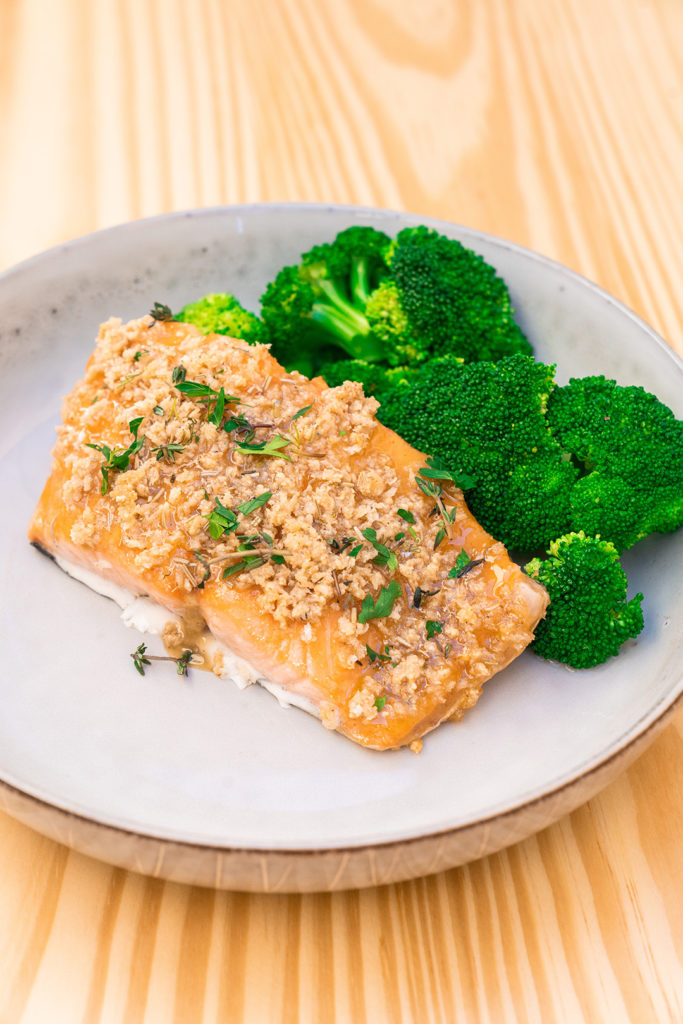
Chicken Salad Lettuce Wraps
Chicken Salad Lettuce Wraps This recipe is high in protein, low in carbs, and loaded with fresh flavors, making it a great choice for a
We all know that food fuels the body, but most of us forget that it also includes our brain. While it is easy to see how processed and sugary food can negatively affect physical health, it is not always so apparent how it affects our mental health. The food we decide to eat does impact our mental health and it is important to eat good fuel to regulate appetite, moods, and emotions.
Your GI tract is home to billions of bacteria that influence the production of neurotransmitters—chemical substances that constantly carry messages from the gut to the brain. (Dopamine and serotonin are two common examples.)
Eating healthy foods promotes the growth of beneficial bacteria in the gut, which in turn supports healthy neurotransmitter production. A diet high in sugar and processed foods, on the other hand, can cause inflammation and impair function. This can lead to negative mood changes. When production is in good shape, your brain receives messages loud and clear, and your emotions reflect it. Therefore, it is important to eat a balanced diet that includes healthy fats, complex carbohydrates, and vitamins to support optimal mental health.


There are several foods that can help improve mental health. Omega-3 fatty acids, for example, are known to support healthy brain function. Foods rich in omega-3s include salmon, walnuts, and flaxseeds. Getting enough omega-3s is important for mental health because they have been shown to help with symptoms of depression, anxiety, and ADHD.
Complex carbohydrates like whole grains and dark leafy greens are also important for mental health as they help to regulate blood sugar levels. When blood sugar levels are stable, it helps to keep energy levels up and prevents mood swings. Grains like brown rice, whole wheat and even oatmeal will sustain the body and beneficial greens to include in your diet are kale, spinach, and collards.
There are certain vitamins and minerals that are especially important for mental health, as they are all found to improve both mood and cognition. These include magnesium, zinc, iron, and vitamin B12 Magnesium is found in dark leafy greens, nuts, and seeds and can help to reduce stress and anxiety. Zinc is found in oysters, poultry, beans, and nuts. Iron is found in red meat, dark leafy greens, legumes, and fortified cereals. Vitamin B12 is found in poultry and eggs. Vitamin D is found in fatty fish, mushrooms, and fortified milk.
In conclusion, the foods we eat have a direct impact on our mental health. If you are struggling with your mental health, consider making changes to your diet and speaking with a mental health professional to see if nutrition therapy could be right for you.

Chicken Salad Lettuce Wraps This recipe is high in protein, low in carbs, and loaded with fresh flavors, making it a great choice for a

Garlic Herb Salmon with Steamed Broccoli This recipe is high in protein, healthy fats, and fiber, making it a great choice for a wholesome, low-carb

Healthy Chicken Enchiladas A lighter version of the classic dish, packed with protein and flavor! Dr. Brittany Tilson Looking for a doctor in the Hemet

Stuffed Mini Bell Peppers with Creamy Chicken Salad A healthy, flavorful, and protein-packed appetizer or snack. Dr. Brittany Tilson Looking for a doctor in the

Kabob & Hummus This kabob and hummus recipe combines ground beef and lamb with fresh parsley, onion, and curry powder, grilled to perfection on bamboo

Courtney’s Chocolate Chip Cookies Discover the joy of baking with Physician Assistant, Courtney Assumma’s irresistible Chocolate Chip Cookies recipe! Crafted with care and packed with

Chuck Roast This Chuck Roast recipe features a savory slow-cooked dish, starting with a seasoned and seared 2lb Primal Pastures Chuck Roast. The cast iron

Taco Meat Enjoy this beef taco meat knowing that it is already perfectly seasoned and ready to put into your skillet or Instant Pot. This